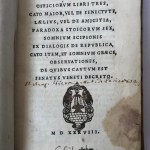CICERO, Marcus Tullius. Officiorum libri tres, Cato maior, vel De senectute, Laelius, vel De amicitia, Paradoxa stoicorum sex, Somnium Scipionis ex dialogis De republica. Cato item, et Somnium Graece, observationes.
Venice, Bartolomeo Zanetti, 1538.
SOLD
8vo, ff. (xi) 129 (xi) 29 (i), a8 b4 A-I8 K4 L8 M10 N-O8 P4 Q10 R6 S4 T6 A-D8. Italic and Greek letter, some Roman. A student’s schoolbook copiously annotated by at least three hands. Sketch of a coat of arms enclosing a fountain and ownership notes on title page, of which the latest two, probably from the 17th and 18th centuries, are easily readable (“Gabriel. Ottobon” and “Gioan Batista Fontana”). No pastedowns. Inner covers, front and rear endpapers show extensive annotations and scribbles, especially by Fontana, who left his purchase note, and several quotations and maxims from classical authors, such as Cicero, Pliny, Martial, Livy, Horace and Polydorus, mainly on Justice and moral teaching. Blank T6 bears register and imprint without date on recto, plus a couple of ms. acronyms and an enthusiastic note: “viva la signora Orsolina Barbaro mia patrona oservandissima”, which is written backwards in two different manners, exalting a certain lady Barbaro who seemed also to have been patron to this student. Imprint repeated in Greek also on last. Initial quires waterstained to lower outer margin, also affecting front cover, no text loss; final quires with waterstaining to lower outer page corners. In contemporary limp vellum, visible ties, ink title to spine, caps slightly defective, lacking laces. An interestingly annotated copy in good condition.
This student’s handbook is a selection of Cicero’s works, among which commented passages from ‘De officiis’, ‘De senectute’, ‘De amicitia’, ‘Paradoxa stoicorum sex’ and ‘De Somnium Scipionis’. A Greek translation of De senectute and the Somnium are found at the end.
‘De officiis’ expounds Cicero’s model of living in society and observe moral obligations. This essay was written in the form of a letter to his son Marcus. ‘De senectute’ is also called ‘Cato Maior’, because it is written in the form of a lecture from the great orator Cato the Elder to Laelius and Scipio Africanus. In ‘De amicitia’, Cicero writes about friendship. Cicero ponders the meaning of friendship by using the relationship between Scipio and Laelius as a model to show his views on this topic. The following work is an attempt to explain six famous Stoic sayings that appear to go against common knowledge. ‘The Dream of Scipio’ is a nightly vision of victory against the Punics set two years before general Scipio oversaw the destruction of Carthage in 146 BC.
This edition also includes an initial letter from the editor, the humanist Paolo Magnolo, to his addressee, the Bishop of Brescia Andrea Cornelio. Furthermore, Magnolo’s “observationes” contain all Cicero’s references to Greek authors, such as Plato, Aristotle and Xenophon. Most of these are based on the excellent earlier Aldine editions on the orator’s works.






